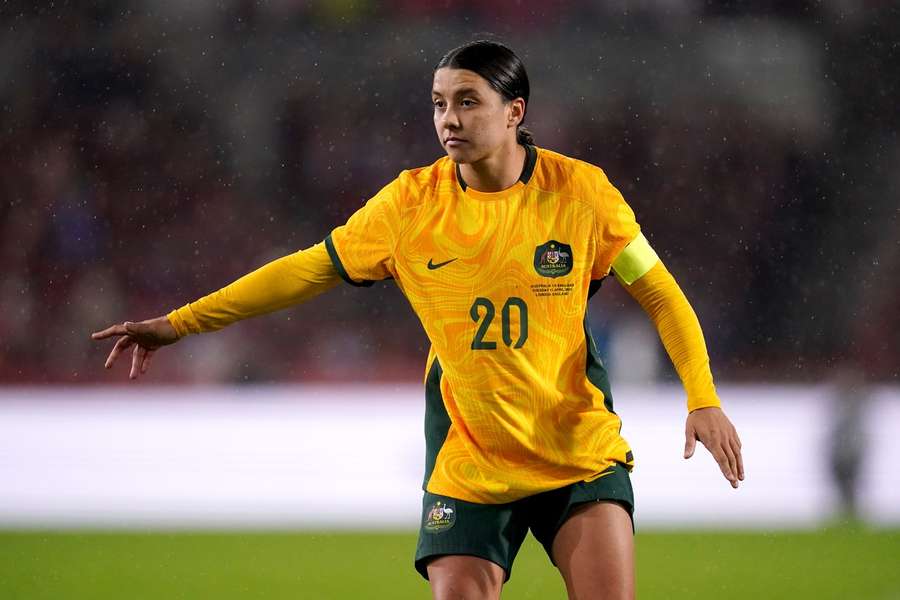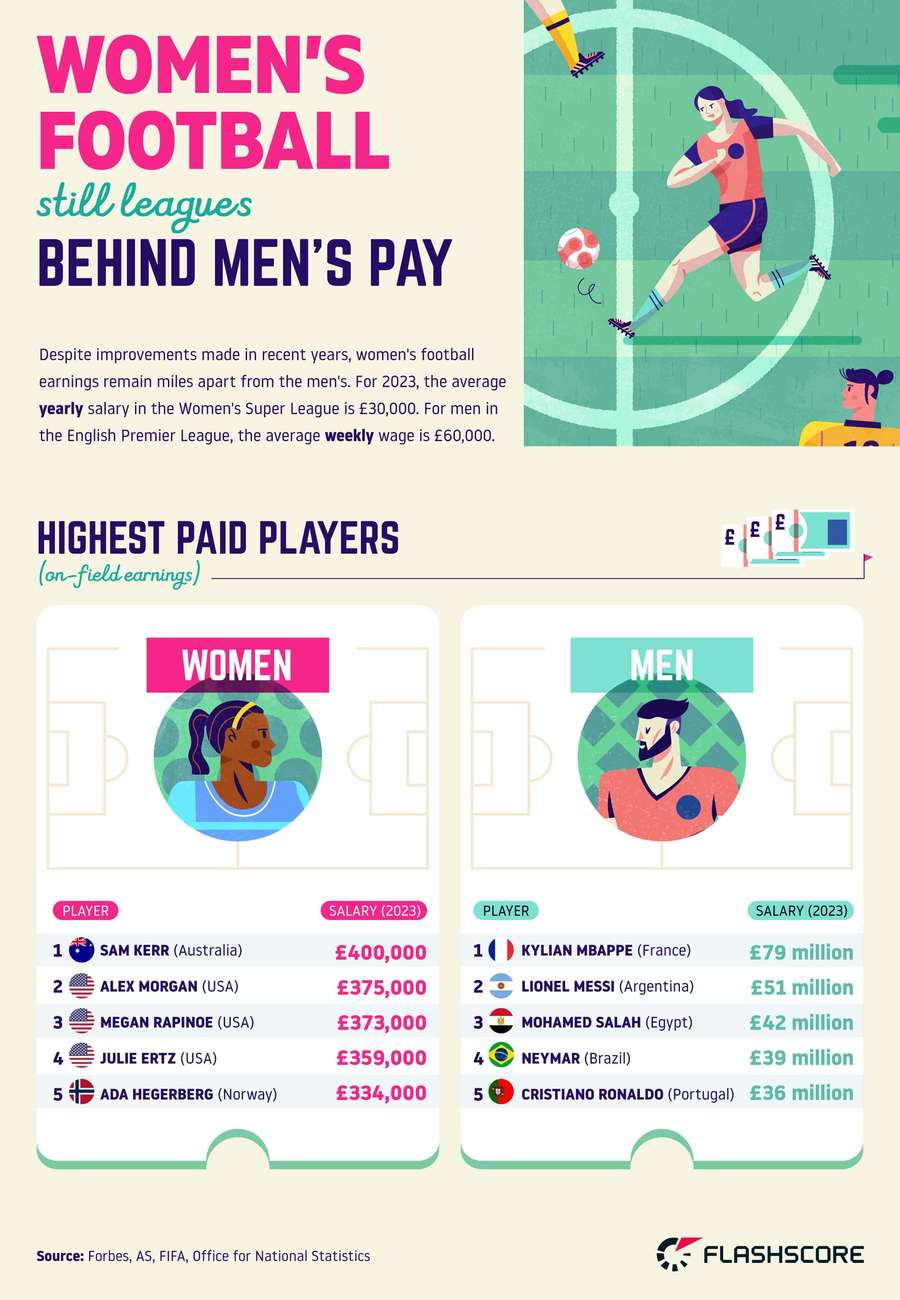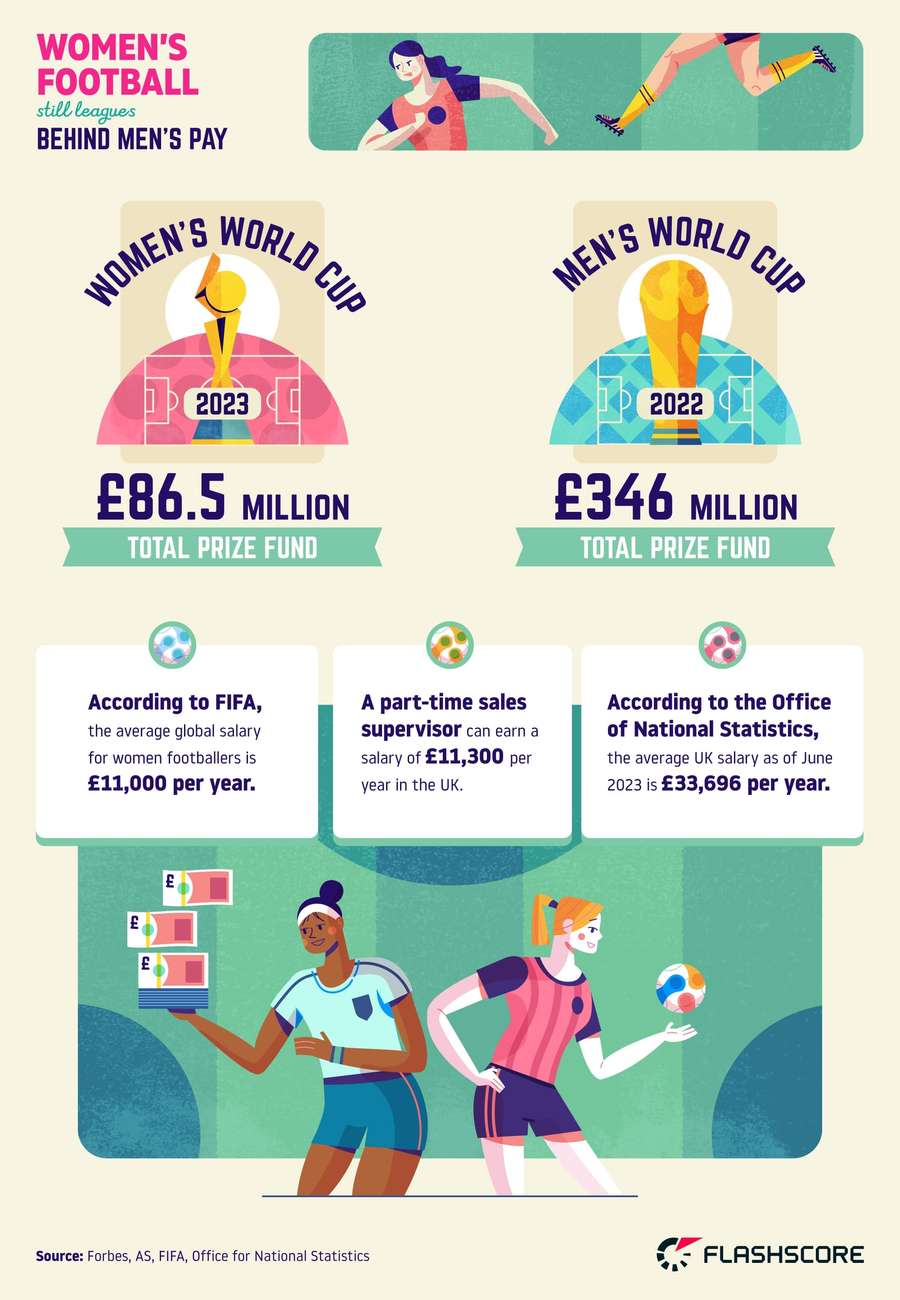Women's football still leagues behind men's pay ahead of World Cup

FIFA has increased the prize pot too. The £86.5 million in total prize money is up 267 per cent from the £23.6m that was provided in the 24-team tournament in 2019.
Federations have improved the compensation given to their women’s teams, some of them providing the same amount given to the men for representing their country. Despite the equal pay, player compensation in the women’s game is still far behind their male counterparts.
With the competition set to kick off in Australia and New Zealand, we’ve looked at the earnings for women representing England, Ireland, and the USA. We then looked at the average salaries for players in domestic leagues such as the WSL and NWSL and compared the compensation they receive to other jobs for non-athletes. We want to put the spotlight on the heroines of the 2023 FIFA Women’s World Cup to show how, despite being inspirations to millions around the world, they’re still battling for equality on and off the pitch.

It is widely reported that the highest-paid women’s player in world football is Australia and Chelsea’s Sam Kerr. The Matildas captain earns an estimated £400,000 a year, which is significantly higher than most high-end jobs in the UK, and almost ten times more than the average salary of a WSL player. The BBC Director-General earns a modest £525,000 in relation to Kerr’s annual pay.
The Aussie skipper may earn more than most of the world’s CEOs, but her compensation for being one of the best female players on the planet is only a tiny fraction compared to most men in her field. According to Forbes’ list of richest footballers, Cristiano Ronaldo is making an estimated annual income of £36m, which equates to £692K per week. Similarly, ahead of his move to Inter Miami, Lionel Messi had been making £51m a year at Paris Saint-Germain, according to Forbes.
The Professional Footballers Association (PFA) reported that the average salary for Premier League players is £60,000 per week. Of course, the likes of Erling Haaland and Harry Kane are earning many times that. Still, the average player in the men’s league is earning £3.1m a year. Meaning in just seven weeks, they’ll earn more than Kerr does in an entire year.
Three of the four highest-paid female footballers in the world play for the US Women’s National Team (USWNT). The undoubted star of the FIFA World Cup in 2019 was Megan Rapinoe, who was named Player of the Match in the final and Player of the Tournament. Rapinoe announced earlier this month she plans to retire following this season.
Rapinoe plays in the National Women’s Soccer League (NWSL) for OL Reign. Her reported salary of £373,000 per year, is slightly less than USWNT teammate Alex Morgan at £375,000. According to capology.com the US Men’s National Team forward, Christian Pulisic, used to earn £150,000 a week at Chelsea, while struggling for game time.
The NWSL has revealed that the average annual salary for its players is £42,519 per year. Each team has a salary cap of roughly £1.08m, a 25 per cent increase from 2022. Popular job site Indeed reports the average salary for all workers is £43,811. With a salary similar to that of an entry-level graphic designer, the average player in the NWSL earns just below the mean salary for the entire nation.
The highest-paid England player is Fran Kirby. The Chelsea forward is estimated to be earning more than £310,000 a year. The Chelsea attacker for the men’s team, Raheem Sterling, is the highest-paid Englishman. He was dropped from the last Three Lions squad, but still earns £325,000 a week.
Kirby’s Chelsea team has won the WSL title in each of the last four seasons. Players in the WSL are employed full-time and earn an average of £47,000 a year, about the same as a software engineer.
Arsenal increased their wage bill for the women’s team and its staff by 30 per cent. The club revealed that the annual budget for its WSL team is £4.3m. The average salary for women in the playing squad is £98,000 per year. According to Glassdoor, this is more than the average of £93,000 for a CEO in the UK.
Deloitte’s Football Money League for 2023, which is an annual profile of the highest revenue-generating clubs in world football, reports that Arsenal’s Premier League team has an annual wage bill of over £200m. The club’s Brazilian forward, Gabriel Jesus, earns a reported £13.7m a year - more than triple the annual budget for the WSL squad and staff.
In Ireland, Katie McCabe is the country’s top player. Though her true salary is unknown, as she plays for Arsenal and we expect she’ll be earning around the squad average of £98,000.
Her Irish teammates are likely to be earning substantially less, especially those competing in the Irish Women’s National League. Like in the WSL, WNL players are full-time athletes. The minimum they are paid is £364 a week, which works out at £18,928 just a year, the equivalent to a personal secretary. The average salary in Ireland is estimated to be £35,764 a year.

Equal Pay
FIFA revealed that the average global salary for female football players is around £11,000 per year, which is slightly less than the average salary for a part-time sales supervisor is £11,300.
Every woman competing at this year’s World Cup is due a big bonus, so for many of them, the appearance fee provides a huge financial gain for the year. Every player will receive £23,500 for being there. This fee will increase through each stage of the tournament, with each player on the eventual world champions earning £211,000.
FIFA announced a significant increase in the prize pot for this tournament. In 2019 the total prize fund was £23.36m. This year it’s grown to £86.5m.
Despite the generous increase, it is nowhere near the £346m total assigned to the men’s tournament in Qatar last year. Still, FIFA maintains its goal is for parity by the 2027 women’s tournament.
The Lionesses, Irish women and USWNT teams have been awarded equal pay to the men. England players, male and female, are paid £2,000 per cap. Irish players are compensated 2,000 euros (£1,716) each per game, and the US players receive £7,874 base pay per player per game, an additional £11,023 for a win, or an extra £3,149 for a draw.
Though these are huge strides since the Women’s World Cup in 2019, the overall pay gap remains colossal. Soon, all eyes will be on Australia and New Zealand for the biggest competition of its kind in women’s football. So we must ask, how level will the playing field be in four years’ time?
Methodology
We’ve looked at the average earnings for players in England, Ireland, and the USA. We compared these earnings to men to determine the disparity between the two genders. As part of our research, we looked at leading UK recruitment websites to work out equivalent salaries for some female players.
The respective football federations for each of England, Ireland, and the USA confirmed that their players are full-time athletes and earn the same as men when competing for their country. We used the most recent exchange rate to work out the USD and EUR conversion to pound sterling. Salary data was compiled from Forbes, AS, FIFA, Indeed, Glassdoor, and The Office for National Statistics.

